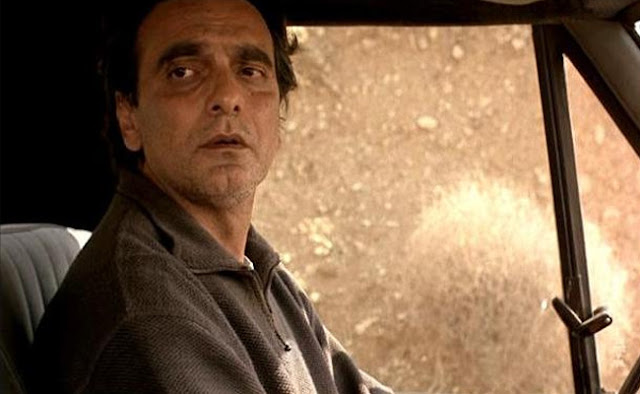 |
| Legendary Iranian filmmaker Abbas Kiarostami |
The world of cinema has suffered an irreparable loss. Abbas Kiarostami is no more. The 76-year-old filmmaking legend was suffering from gastrointestinal cancer. His death marks the end of a great era in world cinema. A towering figure of Iranian cinema, Kiarostami won the coveted Palme d'Or for his 1997 film Taste of Cherry, which presents the story of a desperate man on the verge of suicide who seeks someone willing to bury him discreetly under a cherry tree. Till date he is the only Iranian filmmaker to have won the top honor at Cannes.
 |
| Iranian actor Homayoun Ershadi as Mr. Badii in Taste of Cherry |
Kiarostami's celebrated body of work includes films like Close-Up (1990), The Wind Will Carry Us (1999), Shirin (2008), and Certified Copy (2010), for which Juliette Binoche won the Best Actress award at Cannes. Kiarostami is one of the few Iranian filmmakers who stayed back in Iran after the 1979 Islamic revolution and continued to make films in his native land. In fact, all his films except the last two were made in Iran.
 |
| French actress Juliette Binoche as Elle in Certified Copy |
There are few filmmakers who have inspired the French-Swiss maestro Jean-Luc Godard. Kiarostami happens to be one of them. Godard famously said, after watching Kiarostami’s Life, and Nothing More…(1992), "Film begins with D.W. Griffith and ends with Abbas Kiarostami."
Although, he would later grow to regret his remark, there are elements of Abbas Kiarostami’s earlier works that went on to influence Godard’s later films, such as his 2004 cinematic essay, Notre musique.
Although, he would later grow to regret his remark, there are elements of Abbas Kiarostami’s earlier works that went on to influence Godard’s later films, such as his 2004 cinematic essay, Notre musique.
 |
| A still from Abbas Kiarostami's Shirin |
Kiarostami was born in Tehran in 1976 and studied at the School of Fine Arts at Tehran University. He started off his career by making commercials for Iranian television. He then began making children documentaries before making art films that would go on to win awards around the world. Despite avoiding to make overtly political films, he had constant trouble with the Iran censorship. Yet he chose not to leave his motherland, likening himself to a tree rooted in the ground. Kiarostami said: “If you transfer it from one place to another, the tree will no longer bear fruit... If I had left my country, I would be the same as the tree.” However, the censorship did ultimately force him to make his last two feature films outside of Iran.
 |
| A still from Abbas Kiarostami's Close-Up |
Kiarostami's death has left a deep void in the world of cinema that may take a long time to fill. His cinema was as close to poetry as cinema can ever get. The real beauty of of his cinema lies in its universal appeal. How his realist stories focusing around the lives of ordinary people manage to deliver deep and touching lessons on humanity that succeed in transcending the man-made boundaries is indeed commendable. Kiarostami's cinema is an institution in itself that no student of cinema can afford to ignore. Indeed, it is one for the ages.
Readers, please feel free to share your views/opinions in the comment box below. As always your insightful comments are highly appreciated!
People who liked this also liked...


0 comments:
Post a Comment
Thanks for sharing for valuable opinion. We would be delighted to have you back.